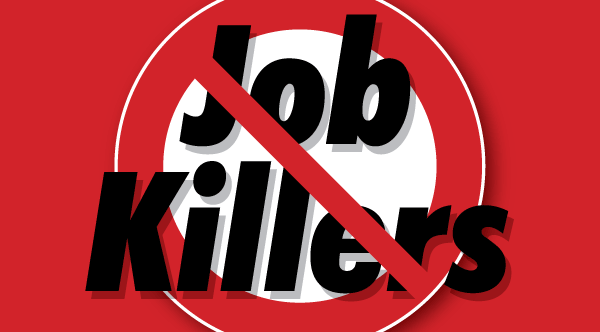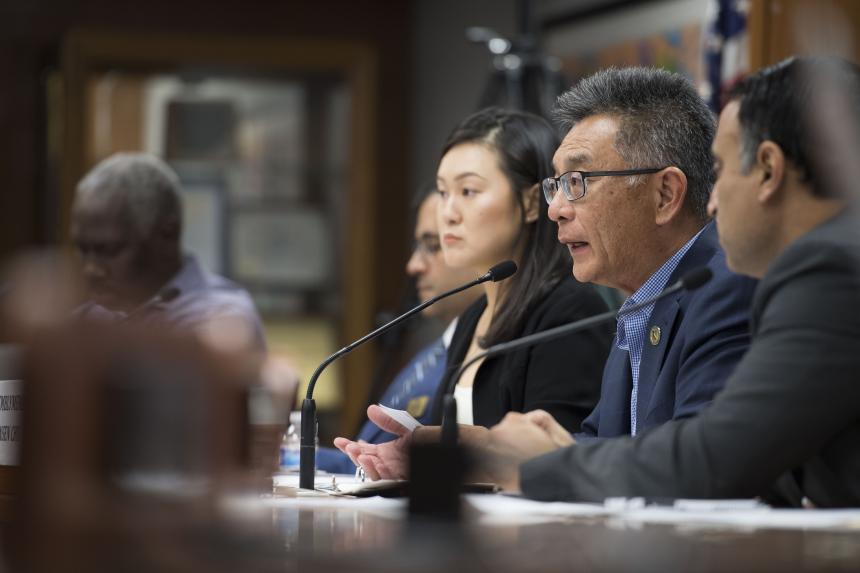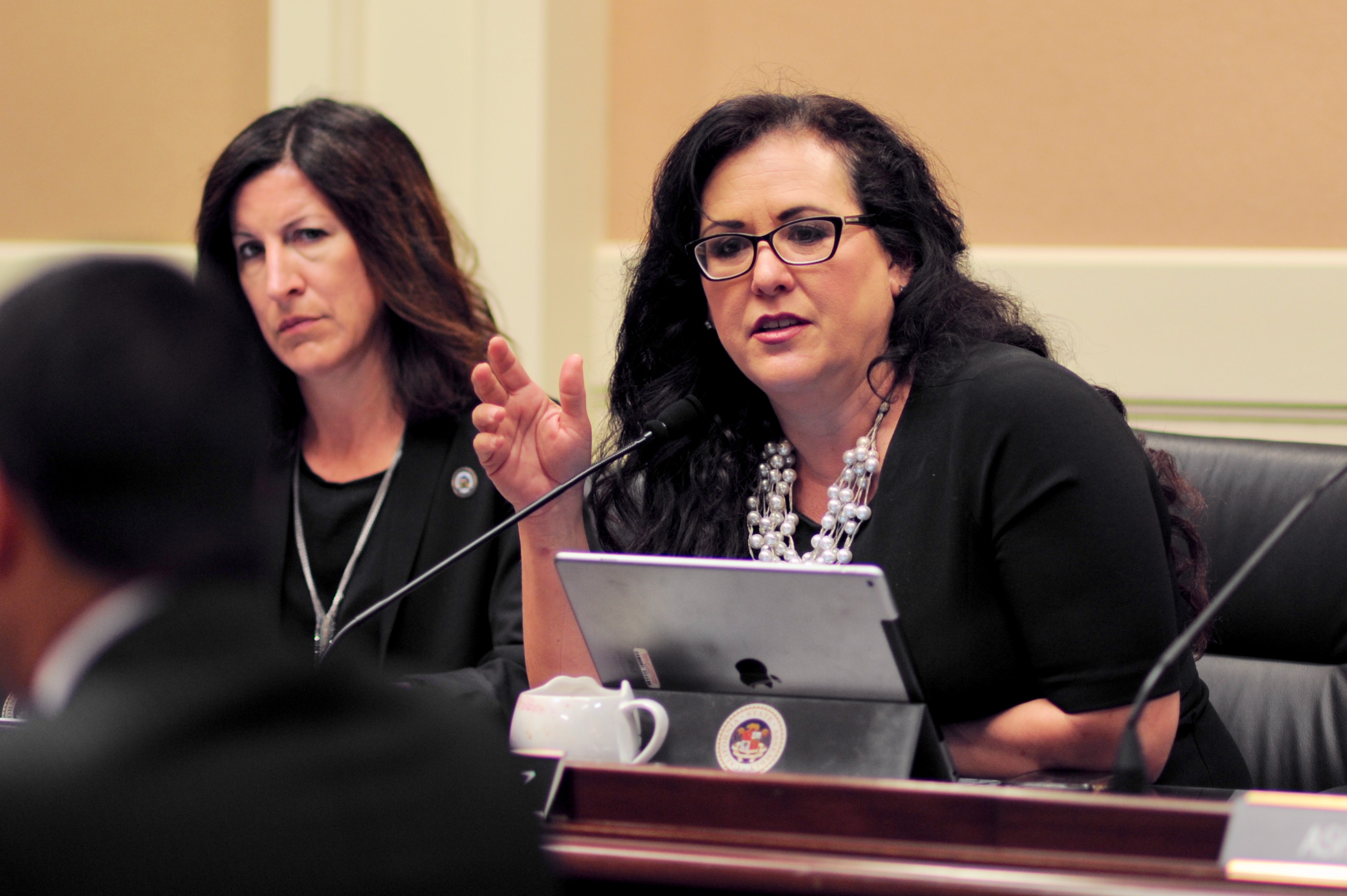
Cal Chamber Job Killers logo. (Photo: CalChamber)
Democrat-run Assembly Isn’t Letting This Crisis Go To Waste
Pushing through as many job-killer bills as possible to advance leftist agenda
By Katy Grimes, June 11, 2020 1:14 pm
The California economy is struggling after the COVID-related state lockdown order by Gov. Gavin Newsom in March. Newsom’s stay-at-home orders forced “non-essential” businesses to close, and led to record unemployment insurance claims.
Faced with a $54.3 billion deficit following the lockdown, many anticipated that Gov. Newsom and the Democrat-controlled Legislature would use the economic crisis to then be the heroes to save California.
Now, it’s looking as if California’s Democrats can’t help themselves or ignore their impulses.
The self-imposed shortened legislative session this year blamed on the coronavirus created a backlog of proposed bills to be heard during the committee process, with the June 15th budget deadline looming. In response, Assembly leaders asked each of the 80 members of the Assembly to cut their bill packets down to just five priority bills, and only present the bills related to COVID, bills with deadlines or sunset dates, or emergency-related legislation.
All other bills will be dropped, or so lawmakers were told.
Sources inside the Capitol report that Republican lawmakers complied, however they are not being allowed to present even their top 5 bills. Some are allowed only one bill, while Democrats are rushing through as many of their bills as possible – unrelated to deadlines, emergencies or COVID – solely to advance the left’s ultra-progressive agenda.
Additionally, bills would normally be put through two or three legislative committees for a balance of input. Sources say that because legislative leaders have decided there just isn’t the time, bills will only be heard in the first committee assigned. So a labor bill may only be heard in the Banking and Finance Committee, rather than in the Labor Committee.
As evidence of this unorthodox “lawmaking,” the California Chamber of Commerce, which tracks and posts its “Job Killer” list every year, has found that very few of the 2020 “job killer” bills have been sidelined.
Here is the Cal Chamber list and commentary from CalChamber President Allan Zaremberg:
2020 Job Killer List
The California Chamber of Commerce has released its annual job killer list, which includes bills that threaten California’s economic recovery and would hurt the ability of employers to rehire or maintain employment of California workers should they become law.
“It’s truly unfortunate—and, quite astonishing—that anyone in the legislature would unnecessarily increase costs on California’s distressed employers and reduce employment opportunities for California workers,” said CalChamber President and CEO Allan Zaremberg.
“Nearly four million Californians have filed for unemployment benefits and many more are without work-related income. Our legislature should focus solely on keeping California employers and workers in business,” said Zaremberg.
CalChamber will periodically release job killer watch updates as legislation changes. Readers are encouraged to track the current status of the job killer bills on www.CalChamber.com/jobkillers or by following @CalChamber and @CAJobKillers on Twitter
2020 Job Killers
- AB 196 (Lorena Gonzalez; D-San Diego) Establishes Costly “Conclusive Presumption” of Injury. Significantly increases workers’ compensation costs for employers by “conclusively” presuming (non-rebuttable) that contraction of COVID-19 by all “essential workers” is a workplace injury. Establishes an extremely concerning precedent for expanding presumptions into the private sector for COVID-19 issues, which the Workers’ Compensation Insurance Rating Bureau (WCIRB) recently estimated will add billions in costs to California’s workers’ compensation system.
- AB 398 (Chu; D-San Jose) Headcount Tax. Punishes certain employers who create jobs and discourages hiring and employment growth by imposing a headcount tax of $275 per employee.
- AB 664 (Cooper; D-Elk Grove) Establishes Costly “Conclusive Presumption” of Injury. Significantly increases workers’ compensation costs for public employers and public and private hospitals by “conclusively” presuming (non-rebuttable) that exposure or contraction of communicable diseases, including COVID-19, are caused by the workplace and defines required compensation to include non-workers’ compensation items such as “temporary housing costs.” Establishes an extremely concerning precedent for expanding presumptions into the private sector for COVID-19 issues, which the Workers’ Compensation Insurance Rating Bureau recently estimated will add billions in costs to California’s workers’ compensation system.
- AB 1107 (Chu; D-San Jose) Massive Unemployment Insurance Compensation and Tax Increase. Would significantly raise employers’ payroll taxes to fund a 130% increase in unemployment payments just as California’s businesses are struggling to survive a pandemic-caused shutdown. Gutted and amended May 26, 2020 to a different subject area. Job killer and oppose tag removed.
- AB 2501 (Limón; D-Santa Barbara) New Burdens for Lenders. Requires lenders to maintain home and auto loans for an extended length of time with no payments from borrowers. This strain imposed on financial institutions will limit the availability of credit in the future, which will harm our economic recovery.
- AB 2992 (Weber; D-San Diego) Expanded Leaves of Absence. Expands three separate leaves of absence on small and large employers with multiple threats of litigation despite the enormous financial strain all size employers are dealing with as a result of the COVID-19 pandemic. This increased burden will limit employers’ ability to recover, including limiting their ability to rebuild their workforce. Opposition and job killer tag removed due to May 11, 2020 amendments.
- AB 2999 (Low; D-Campbell) New Protected Leave and Threat of Litigation. Imposes a significant new burden on employers of every size by mandating that they provide employees up to 10 days of bereavement leave upon the death of a spouse, child, parent, sibling, grandparent, grandchild, or domestic partner, regardless of how long the employee has worked for the employer. The bill further opens up new avenues for litigation against California employers by establishing a new private right of action (in addition to liability under the Private Attorneys General Act (PAGA) and administrative enforcement through the Division of Labor Standards Enforcement).
- AB 3075 (Lorena Gonzalez; D-San Diego) Local Wage Standards. Allows interference with corporate formation based on arbitrary, unclear and unfair standards. The bill would also result in chaotic and inconsistent enforcement of wage and hour laws by local jurisdictions by authorizing them to impose their own wage payment requirements as long as they are “at least as stringent” as state law requirements.
- AB 3216 (Kalra; D-San Jose) New COVID-19 Employment Leave Mandate. Provides for unlimited job protected leave for all employees of employers of any size for family and medical leave due to COVID-19. This new mandate is in addition to numerous COVID-19 leave requirements recently enacted at the federal, state and local levels. The bill creates additional burdens on California employers at a time they can least afford it.
- SB 893 (Caballero; D-Salinas) Expands Costly Presumption of Injury. Significantly increases workers’ compensation costs for public and private hospitals by presuming that certain diseases (including COVID-19) and injuries are caused by the workplace and establishes an extremely concerning precedent for expanding presumptions into the private sector.
- SB 950 (Jackson; D-Santa Barbara) Expansion of CEQA. Would expand the California Environmental Quality Act’s existing requirements by adding costly new mandates that will burden local agencies, add substantial time and costs to the CEQA process and provide project opponents with new legal arguments to delay or block housing and other projects. Failed passage in Senate Environmental Quality Committee, May 29, 2020. Reconsideration granted.
- SB 1399 (Durazo; D-Los Angeles) Increased Costs and Liability on Employers. Imposes unfair and onerous burdens on any essential business in the apparel industry, including a $600,000 bond to operate, which will force businesses to reduce their workforce or close down their business, given the financial strain they are already under from this pandemic.
Previously Identified as 2020 Job Killers
Note: The authors of these previously identified job killer bills have indicated they are no longer pursuing the bills this year.
SB 850 (Leyva; D-Chino) Mandated Scheduling Requirement. Eliminates worker flexibility and exposes employers to costly penalties, litigation, and government enforcement, by mandating employers in the retail, grocery, or restaurant industry, including employers who have hybrid operations that include a retail or restaurant section, to provide a 21-day work schedule and then face penalties and litigation if the employer changes the schedule with less than 7 days notice.
SB 873 (Jackson; D-Santa Barbara) Increased Litigation. Exposes businesses to costly litigation for a consumer’s assertion that any price difference on “substantially similar” goods, even a nominal amount, is based on gender and therefore the consumer is entitled to a minimum of $4,000.
2019 Job Killer Carry-Over Bill
AB 345 (Muratsuchi; D-Torrance) Oil and Gas Development Ban. Previously identified as a 2020 job killer. Author has indicated he is no longer pursuing the bill this year. Threatens to eliminate thousands of high paying California jobs, result in California importing even more foreign oil, and raise oil and gas prices by requiring the California Geologic Energy Management Division to adopt regulations with predisposed setback requirements for new and existing oil and gas wells. By pre-determining arbitrary setback requirements before the agency analyzes safety requirements during formal rule making, the bill politicizes and undermines the state agency responsible for managing oil and gas operations that would likely lead to significant and unnecessary increases in costs for all Californians.
Never let a crisis go to waste
Capitol sources say that Democrats are going about their business pretending there is no crisis, and pushing the bills they wanted to push all along.
- Sen. Weiner’s Bill is Turning Every Neighborhood in California into a Dangerous Political Experiment - February 11, 2026
- California to Feed College Students via ‘CalFresh for Students Act’ - February 10, 2026
- Exclusive: New Civil Rights Complaint Against UC Berkeley for Discrimination - February 10, 2026





Self inflicted so no rescue money.
The founders of our great country made it plain it was to be run by a moral people. The basis of our Constitution is the Bible. That is the source of our Rights that the Constitution protects. Equality for all. Responsibility for all. But now we see how many godless, immoral people are in office ignoring the equality and responsibility aspects of the
Bible and Constitution. Once this State is dead and all businesses have moved out who will be taxed then? Like all liberal ideas it takes someone else’s work and wealth to make it work but only until the money runs out. How many in the legislature own a business in California and how many have carved out exemptions for themselves?
Newsom has carved out exemptions for his Plumpjack Winery…. he needs to be recalled ASAP….